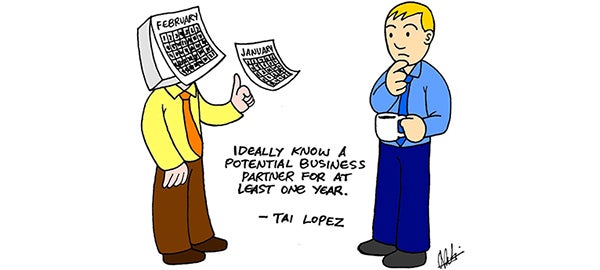Great businesses are founded on great partnerships. But great businesses can also be destroyed by bad partnerships.
These entrepreneurs—and members of The Oracles—share their hard-won wisdom about what to watch out for before joining forces with a business partner.

Jack CanfieldImage credit: The Oracles
1. Trust your gut and get it on paper.
All of my success has come from successful partnerships: co-authoring the Chicken Soup for the Soul series with Mark Victor Hansen; The Success Principles with Janet Switzer; and managing my companies with Patty Aubery and Russ Kamalski. My top two criteria for partnering are: One, I must like them and trust the person. Two, they have to bring something to the table that I cannot myself provide. Liking them and trusting them are subjective things, but I’ve learned to trust my gut. If anything doesn’t feel right, I don’t proceed.

One of the biggest mistakes you can make when partnering is not sufficiently clarifying each other’s roles, boundaries, compensation, and exit strategies and then documenting them on paper. While it’s important to trust each other, it’s also important to ensure you are clearly on the same page before you start. People often have different understandings and interpretations if they are not codified in writing.

Tai LopezImage credit: The Oracles
2. Know the partner for at least a year.
Before entering a business partnership, my top criterion is to ideally know someone for at least one year. (Some psychology and scientific studies say that people truly show who they are after one year.)
It’s like dating—you have to date before you get married. A business partnership is a marriage. So you need some short-term “dating projects” in business. Become good at reading people and back it up with references. If projects don’t work out, you move on. It’s like choosing not to see someone after three dates: you haven’t made a long-term commitment and will be OK.

The biggest mistake you can make in partnering is going into it too quickly. Make sure you outline the responsibilities of each partner. Otherwise, you might get stuck doing all the work.
In the operating agreement, write out the partner's responsibilities, your rights and the exit strategy. Something like, “You'll work approximately 30 hours doing A, B, C, and five hours doing Z.” The more clear you are, the less likely it is to fail.

Roberto OrciImage credit: The Oracles
3. Use math, but don’t forget the fun.
Partnerships can be wonderful, but also can become your worst nightmare. Use math to decide on the right partners. That's right, math. If one plus one equals two, that's not the right partnership for you. One plus one must equal three! A partnership must be more than the sum of its parts; otherwise, you'd just as well outsource different parts of your business.
You should also partner with someone who is better than you at certain things. Many times I’ve seen people’s egos prevent them from building great partnerships. They felt threatened by their partner's skill and couldn't get past that to achieve a grander vision. "The Father of Advertising,” David Ogilvy said you should hire people smarter than you.

Finally, you must ensure that you're going to have fun. After all, you're entering the long-term commitment of a business marriage. It's going to become a deep part of your life. There will be lots of ups and downs. You will be tested. But what's the point if it isn’t going to be fun? Resist the seduction of your partner's resume or their prestige; if you aren’t having fun, the partnership won't last.
James SwanwickImage credit: The Oracles
4. X-ray their brain.
The first thing I do is ask a potential partner to take the HEXACO and dark triad personality tests, which are like x-rays into their brain. It's important to know the personality type that you're dealing with because a business partnership is like a marriage.
Secondly, I look for people with different, complementary skills to my own but who share the same vision. It's not enough just to like someone, which is how I used to think. If you're an extrovert, look for introverts. If you're the face of the company, maybe you need a nitty-gritty operations person behind the scenes. Likewise, if you're that operations person, perhaps you need someone more extroverted.

The biggest mistake I ever made in partnering was going into business with three other partners. Too many cooks spoiled the broth, you might say. I thought a range of personalities and opinions would be good, but it created too many conflicts, egos, obstacles, and slowed everything down. The perfect scenario is two to three partners, but four seemed too many.
Chris PloughImage credit: The Oracles
5. Get on the same page upfront.
I form partnerships that are win-win, long-term, and relationship-based. Our contract simply becomes a way to document our understanding and an insurance policy if leadership changes. To get there, we sit down to share and clarify two things:
One, core values. We check for alignment and allow both sides to develop trust by understanding the other’s key drivers. These can be relied upon when things get difficult and the relationship is stressed.

Two, business baggage. We share our business baggage to ensure we’re starting on the right foot. This includes outlining our expectations and commitments for the partnership, so that they’re openly shared and can be met. We also share our fears and desires for the partnership, so that they can be addressed in the planning phase, rather than at a point of conflict.
Together, these allow the creation of healthy, profitable partnerships that withstand the stresses of business.
Phil SuslowImage credit: The Oracles
6. Don’t be afraid to walk away.
Consider a personality test such as the Myers-Briggs Type Indicator. This will develop self-awareness of your working preferences and provide a better understanding of how your partner operates. But, there’s a dichotomy—ideally, you want to balance each other out, but you don’t want to drive each other crazy from being too different. If it resonates with you, maybe look into an astrology compatibility report for yourself and potential partners—it’s simply more due diligence.
Ensure that your end goals are aligned. For example, do you want to operate as a passive lifestyle business or build it to sell for huge multiple figures? How many hours a week do you want to dedicate to the business? What staff do you want to hire? Do you have any other projects or commitments which will conflict with the business or distract your attention too much? Is your family on-board with the business venture?

The biggest mistake I've made in any partnership stems from my fear of confrontation; I struggle with difficult conversations. Once, I delayed ending a partnership for too long—even though I knew it wasn't the right fit. It created a lot of unnecessary inner turmoil and wasted energy, when I could have been building something that was more suited to me.
If you’re an experienced entrepreneur, please get in touch here.
Email [email protected] and it’s very possible we’ll make your suggestion the focus of a future article!


